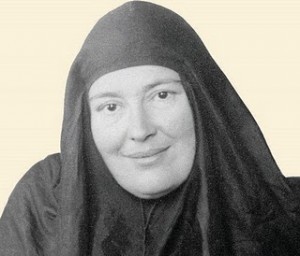
The holy and glorious venerable-martyr Maria Skobtsova (also Saint Mary of Paris or Mother Maria) was a nun and martyr in Paris in the early twentieth century. She encouraged hospitality and love of one’s neighbor, often in the most uncompromising of terms. She considered this to be the foundation of the Christian gospel, and she embodied it in her life. She is often compared to Dorothy Day, an American Roman Catholic who founded the Catholic Worker movement. Saint Mary died a martyr in Ravensbrück prison. She was glorified by the Church of Constantinople on January 16, 2004, along with her companions, Priest Dmitri Klepinin, her son George (Yuri) Skobtsov, and Elie Fondaminsky. They are commemorated on July 20.
Born to a well to do, upper-class family in 1891 in Latvia, she was given the name Elizaveta Pilenko. Her father died when she was a teenager, and she embraced atheism. In 1906 her mother took the family to St. Petersburg, where she became involved in radical intellectual circles. In 1910 she married a Bolshevik by the name of Dimitri Kuzmin-Karaviev. During this period of her life she was actively involved in literary circles and wrote much poetry. Her first book, Scythian Shards, was a collection of poetry from this period. By 1913 her marriage to Dimitri had ended.
Through a look at the humanity of Jesus—”He also died. He sweated blood. They struck his face”—she began to be drawn back into Christianity. She moved—now with her daughter, Gaiana—to the south of Russia where her religious devotion increased.
In 1918, after the Bolshevik Revolution, she was elected deputy mayor of the town of Anapa in Southern Russia. When the White Army took control of Anapa, the mayor fled and she became mayor of the town. The White Army put her on trial for being a Bolshevik. However, the judge was a former teacher of hers, Daniel Skobtsov, and she was acquitted. Soon the two fell in love and were married.
Soon, the political tide was turning again. In order to avoid danger, Elizaveta, Daniel, Gaiana, and Elizaveta’s mother Sophia fled the country. Elizaveta was pregnant with her second child. They traveled first to Georgia (where her son Yuri was born) and then to Yugoslavia (where her daughter Anastasia was born). Finally they arrived in Paris in 1923. Soon Elizaveta was dedicating herself to theological studies and social work.
In 1926, Anastasia died of influenza—a heartbreaking event for the family. Gaiana was sent away to Belgium to boarding school. Soon, Daniel and Elizaveta’s marriage was falling apart. Yuri ended up living with Daniel, and Elizaveta moved into central Paris to work more directly with those who were most in need.
Her bishop encouraged her to take vows as a nun, something she did only with the assurance that she would not have to live in a monastery, secluded from the world. In 1932, with Daniel Skobtov’s permission, an ecclesiastical divorce was granted and she took monastic vows. In religion she took the name Maria. Her confessor was Father Sergius Bulgakov. Later, Fr. Dmitri Klepinin would be sent to be the chaplain of the house.
Mother Maria made a rented house in Paris her “convent.” It was a place with an open door for refugees, the needy and the lonely. It also soon became a center for intellectual and theological discussion. In Mother Maria these two elements—service to the poor and theology—went hand-in-hand.
When the Nazis took Paris in World War II, Jews soon approached the house asking for baptismal certificates, which Father Dimitri would provide them. Many Jews came to stay with them. They provided shelter and helped many escape. Eventually the house was closed down. Mother Maria, Fr. Dimitri, Yuri, and Sophia were all taken by the Gestapo. Fr. Dimitri and Yuri both died at the prison camp in Dora.
Mother Maria was sent to the camp in Ravensbrück, Germany. On Holy Saturday, 1945, Mother Maria was taken to the gas chamber and entered eternal life. It is suggested that she took the place of another who had been selected for that death.
Mother Maria was glorified by act of the Holy Synod of the Ecumenical Patriarchate on January 16, 2004. The glorification of Mother Maria, together with Fr. Dimitri, Yuri, and Ilya Fondaminsky took place at the Cathedral of Saint Alexander Nevsky in Paris on May 1 and 2, 2004. Their feast day is July 20. Mother Maria has also her “dies natalis” as feast day on March 31.
